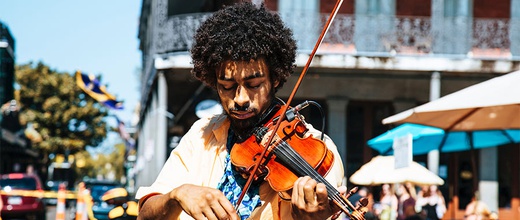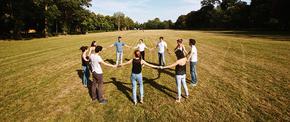The views expressed in our content reflect individual perspectives and do not represent the authoritative views of the Baha'i Faith.
A friend recently asked me, “How do you record your songs with excellence, while letting go of your perfectionism?” My answer was pretty simple: “It’s really, really hard!”
While I’ve recorded music for more than a decade, and am currently in the process of producing my sixth studio album, trying to strike a balance between striving for excellence and being detached from the standards that I and society have set for myself continues as a constant personal struggle.
But I’ve been encouraged to practice excellence in all things for as long as I could remember. My parents made every effort to ensure that I had all the tools I needed for achieving excellence in every aspect of life. Also, the Baha’i writings regard excellence as a spiritual quality, and highly encourage the practice of attempting to achieve it, particularly when performed in service to humanity. The following words of Abdu’l-Baha offered my parents great motivation in their efforts and support of my pursuit for excellence:
Wherefore, O loved ones of God! Make ye a mighty effort till you yourselves betoken this advancement in all these confirmations, and become focal centres of God’s blessings, daysprings of the light of His unity, promoters of the gifts and graces of civilized life. Be ye in that land vanguards of the perfections of humankind; carry forward the various branches of knowledge, be active and progressive in the field of inventions and the arts. Endeavour to rectify the conduct of men, and seek to excel the whole world in moral character. While the children are yet in their infancy feed them from the breast of heavenly grace, foster them in the cradle of all excellence, rear them in the embrace of bounty. Give them the advantage of every useful kind of knowledge. Let them share in every new and rare and wondrous craft and art. Bring them up to work and strive, and accustom them to hardship. Teach them to dedicate their lives to matters of great import, and inspire them to undertake studies that will benefit mankind. – Selections from the Writings of Abdu’l-Baha, p. 129.
Abdu’l-Baha called us to action by encouraging us to “carry forward various braches of knowledge,” “dedicate our lives to matters of great import,” and “undertake studies that will benefit mankind.” Although he did ask us to become the “vanguards of the perfections of humankind,” to strive to possess the qualities and attributes that lead to human perfection, he didn’t call on us to be perfectionists.
So why does it frustrate us when things don’t end up feeling like they look or sound 100% perfect? Does this mean we’re compromising our pursuit for excellence? Are we showing weakness or settling for less when we share work that, in our eyes, is less than perfect?
Webster’s dictionary defines the word perfect as “being entirely without fault or defect.” Am I, this tiny speck of dust, living a very temporary existence on this earthly plain, even mildly capable of being entirely without fault? No, I don’t think so.
Although Abdu’l-Baha makes the following statement, calling on those who practice a craft to “produce that which will manifest the greatest beauty and perfection,” he prefaces it by stating that we should exert our highest endeavor and diligently pursue our professions, each to our own will and capacity:
It behoveth the craftsmen of the world at each moment to offer a thousand tokens of gratitude at the Sacred Threshold, and to exert their highest endeavour and diligently pursue their professions so that their efforts may produce that which will manifest the greatest beauty and perfection before the eyes of all men. – Selections from the Writings of Abdu’l-Baha, p. 145.
I understand this statement, not as an expectation of personal perfection, but as encouragement to strive in the pursuit of perfection and excellence.
I hold myself and my work to a pretty high standard. Those who know me well can attest to my high expectations of myself, and I often hold others who I believe in to that same standard. But I also strive to recognize when to let go of those expectations. I’ve personally learned that this doesn’t mean showing weakness or compromise, but represents another spiritual quality which I strive to adopt during the creative process—detachment:
Our greatest efforts must be directed towards detachment from the things of the world; we must strive to become more spiritual, more luminous, to follow the counsel of the Divine Teaching, to serve the cause of unity and true equality, to be merciful, to reflect the love of the Highest on all men, so that the light of the Spirit shall be apparent in all our deeds … – Abdu’l-Baha, Paris Talks, p. 87.
Making art means creating beauty. As artists, when we fall short of that lofty goal—and we usually do—we often become our own worst critics. But as I’ve reflected on the above passages from the Baha’i teachings, I’ve realized that striving for excellence and perfection requires a lifelong journey. We have to honor this journey as part of our personal growth process as artists—or in any profession—and recognize when we’re being too hard on ourselves, to the detriment of this growth process.
As artists we make ourselves incredibly vulnerable, which also shows a great deal of courage—another spiritual attribute. We make ourselves vulnerable to the expectations of ourselves, others and the standards informed by society. But often those standards are not in our own best interests, so we show courage when we don’t let those standards dictate our process. So many factors go into the process of creation, much of it beyond our control—which means that no one, including ourselves, can rightfully hold us accountable to the perception of perfection.
Instead, let’s all strive for excellence rather than perfection. Excellence simply asks that we do our own personal best in that moment of creation.

















Comments
Sign in or create an account
Continue with Facebookor